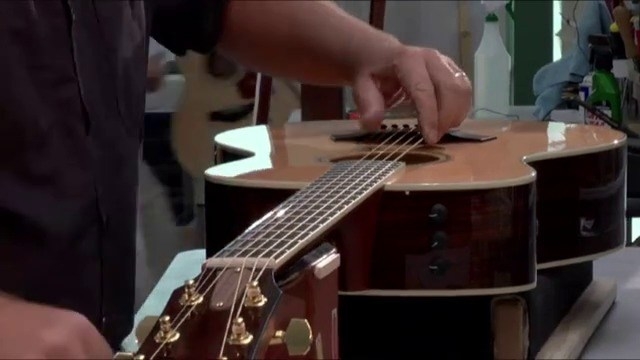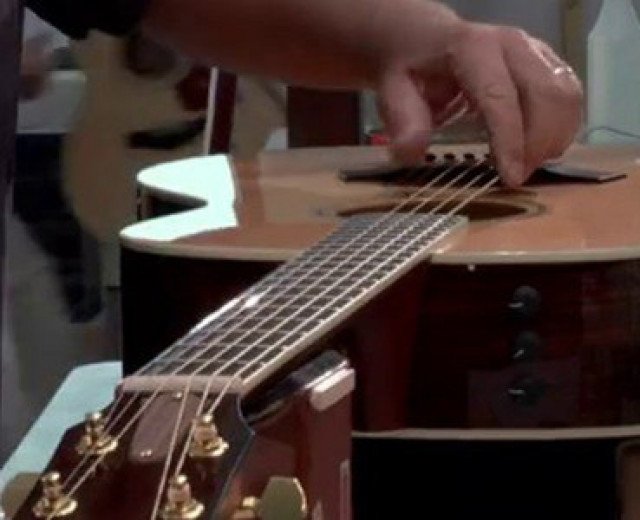You also need to learn helpful skills
about guitar to make your playing experience more enjoyable. One factor that
can affect the sound quality of your guitar is the strings. An electric guitar
requires frequent restringing as compared to an acoustic guitar. Therefore, it
is important that you learn how to restring a guitar.

Restringing a
guitar is a simple task. It does not require a special skill to complete the
job. This post will guide you on how you will restring your guitar by following
these 5 easy steps.
What You Need:
- New strings
- Wire cutters
- Tuner
(Optional)
- String Winder (Optional)
The first thing that you
need to do is to find a place where you can restring your guitar without any
destruction. The area should be clean so you will not lose anything. Keep in
mind that this task involves tiny items that you might lose during the process.
It is also important that
you work in a quiet area so you can tune your guitar easily. Prepare everything
you need and make sure that it is placed in an area that is easy to reach. You
can choose the strings that you want, Soundsation offers a wide range of
strings
to choose from.
Steps in Restringing an Acoustic Guitar
Step #1 – Loosen and Remove
the Tension of Each String
Use the tuning key or turn
each peg by hand to loosen the tension of each string. To remove it unwind the
string off of the tuning post. Take the pins out of the bridge using pliers or
the tip of a screw driver. After removing the pin, you can now remove the
string from the guitar bridge.
Note: Make sure that the end
of the ball of string is secured to the underside of the bridge to sustain a tone.
The ball end should not sit on the pin tip or it will become loose.
Step #2 – Put the String and
Bridge Pin
To place the string and
bridge pin on the 6E bridge hole, slide the pin along with the string on the
sound hole. Pull the string using your other hand and push the pin into the
hole as you put it in place. Put the string into the tuning post around 3
inches and tighten it. You have to pull the string towards the bridge.
Note: Cut the string about
two inches from the machine head so you can poke it into the machine head
shaft.
Step #3 – Wind the string
Carefully twist the low strings (E,A,G) in a counter-wise direction; for high
strings (G,B,Mi) twist the string in the opposite direction (clock-wise).
Step #4 – Tune your Acoustic
Guitar
For beginners, using a tuner
to tune the strings is very helpful. Use wire cutters to cut any extra string.
If you let excess string to hang you might have difficulties playing the
guitar.
Steps on Restringing an
Electric Guitar
Just like for the acoustic guitar, place the new
strings one by one. To restring an electric guitar follow the same process
above mentioned, but keep in mind the bridge and machine heads types of your
instrument.
About the bridge:
If you have a Gibson style guitar, place the new string into the tailpiece
found underneath the body. If you have a non-locking Fender guitar, place the
new string into the tremolo activity. Make sure that you leave at least 3
inches of slack that you will need for winding. On the other side of the hole
keep your thumb, stop the string from threading into the post as soon as it
hits your thumb.
About the machine
heads:
Carefully twist the string in a counter-wise direction for in line machine
heads (Fender style). For high strings (G,B,Mi) on 3 + 3 headstocks twist the
string in the opposite direction (clock-wise). Remember to change strings one
by one and to strecth the strings while tuning to achieve a better result.
If you find this how to article helpful, feel free to
share it with others.
Author bio
I’m Alex Frank who has worked sound technology industry for 10 years now. Today, I am an affiliate blogger who likes to educate my audience more about sound technology. Visit to musicinstrumentscenter.com to find all information about music that you need.
